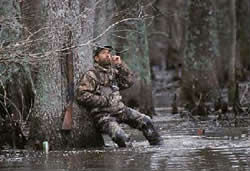Duck Calling Tips & Instructions
If you want to improve your duck calling abilities, follow these 10 duck calling tips:
1. If you see that the birds approach you, it is imperative that you stop calling immediately.
2. If you notice that the ducks start to flap their wings in a temperamental manner, you should "hit" them by using a comeback call as soon as you can. By doing so you can persuade them to return towards your position.
3. Single quacks should be used if you think that they will break the line. In these situations feed calls are also recommended.
4. Try to anticipate their swing. While they start circling, looking for a landing zone, start calling them.
5. Keep in mind that you must combine the regular whistle with the mallard calls. Young hunters should be able to use these calls easily and successful calling will raise their confidence level. Don't forget about the mallard drake sound which shouldn't be discontinued especially when there is no wind.
6. When calling, you must always start by using a high volume and as time goes by, start downing the scale (with no startup scale ).
7. Use the most appropriate call for the type of duck you are about to hunt.
8. If you are about to do some team hunting, the calling should be also done in a team - don't try competing against one another. Do the calling in turns if you both want to try your calling skills.
9. You must be aware of the fact that only some of the ducks respond to calls in nature, so don't panic in case you cannot make them respond to your calls.
10. Don't do the same thing over and over again. In other words, if you see that your calling isn't working then change it, try something else and maybe you will be more efficient. Same goes for the calls, try changing them and find out the ones that work best for you.
Here are other duck calling instructions that can be useful the next time you are out in the wilderness, hunting ducks:
1. If you see that the birds approach you, it is imperative that you stop calling immediately.
2. If you notice that the ducks start to flap their wings in a temperamental manner, you should "hit" them by using a comeback call as soon as you can. By doing so you can persuade them to return towards your position.
3. Single quacks should be used if you think that they will break the line. In these situations feed calls are also recommended.
4. Try to anticipate their swing. While they start circling, looking for a landing zone, start calling them.
5. Keep in mind that you must combine the regular whistle with the mallard calls. Young hunters should be able to use these calls easily and successful calling will raise their confidence level. Don't forget about the mallard drake sound which shouldn't be discontinued especially when there is no wind.
6. When calling, you must always start by using a high volume and as time goes by, start downing the scale (with no startup scale ).
7. Use the most appropriate call for the type of duck you are about to hunt.
8. If you are about to do some team hunting, the calling should be also done in a team - don't try competing against one another. Do the calling in turns if you both want to try your calling skills.
9. You must be aware of the fact that only some of the ducks respond to calls in nature, so don't panic in case you cannot make them respond to your calls.
10. Don't do the same thing over and over again. In other words, if you see that your calling isn't working then change it, try something else and maybe you will be more efficient. Same goes for the calls, try changing them and find out the ones that work best for you.
Here are other duck calling instructions that can be useful the next time you are out in the wilderness, hunting ducks:
a) When the ducks approach your position, they have three zones, as follows: an entry zone, then comes the working zone and finally the exit zone. It is imperative to capture their attention when they are coming into the working zone. If you don't, then it is advisable not to call them. So stay alert and as soon as you spot the ducks start calling and try keeping them interested until their attention is focused on your decoys.
b) A duck hunter must never give up - don't stop calling if you see that ducks aren't responding. Be as persistent as possible, and sooner or later you will get their attention.
c) When calling, all notes should be short, as natural as possible because otherwise you won't have too much success. Each note of descending call should be separated from the preceding note slightly instead of calling with no interruptions.
d) When you spot some ducks at a big distance, start calling (even if your sounds probably won't be 100% clearly heard). Once they gets closer do some short calls, 4-5 quacks maybe. If you see that the ducks have lost interest and they fly away you must become urgent and passionate while keeping a realistic feeling at the same time.
e) Try learning to call using one hand keeping in mind that the call should be held firmly and the opening insert shouldn't be obstructed. Keep practicing until you get the hang of it - duck calling is like learning how to ride a bike, once you have managed to learn how to do it, you will never forget.
f) You must keep your call in perfect shape otherwise it will greatly reduce its efficiency. The reed should be kept tight while the call should be kept as clean as possible. In order to do so, you should flush it in cool/cold water frequently. Occasionally, you should pull it apart, remove the cork and the reed, clean it thoroughly and carefully reassemble it again.
All things considered, duck calling isn't very hard to learn if you keep practicing on a regular basis. One last piece of advice would be that you should go hunting with other experienced hunters, observe how they call, and try "stealing" some tips & tricks from them.
b) A duck hunter must never give up - don't stop calling if you see that ducks aren't responding. Be as persistent as possible, and sooner or later you will get their attention.
c) When calling, all notes should be short, as natural as possible because otherwise you won't have too much success. Each note of descending call should be separated from the preceding note slightly instead of calling with no interruptions.
d) When you spot some ducks at a big distance, start calling (even if your sounds probably won't be 100% clearly heard). Once they gets closer do some short calls, 4-5 quacks maybe. If you see that the ducks have lost interest and they fly away you must become urgent and passionate while keeping a realistic feeling at the same time.
e) Try learning to call using one hand keeping in mind that the call should be held firmly and the opening insert shouldn't be obstructed. Keep practicing until you get the hang of it - duck calling is like learning how to ride a bike, once you have managed to learn how to do it, you will never forget.
f) You must keep your call in perfect shape otherwise it will greatly reduce its efficiency. The reed should be kept tight while the call should be kept as clean as possible. In order to do so, you should flush it in cool/cold water frequently. Occasionally, you should pull it apart, remove the cork and the reed, clean it thoroughly and carefully reassemble it again.
All things considered, duck calling isn't very hard to learn if you keep practicing on a regular basis. One last piece of advice would be that you should go hunting with other experienced hunters, observe how they call, and try "stealing" some tips & tricks from them.
Duck Calling Video
General Info
Equipment & Tools








